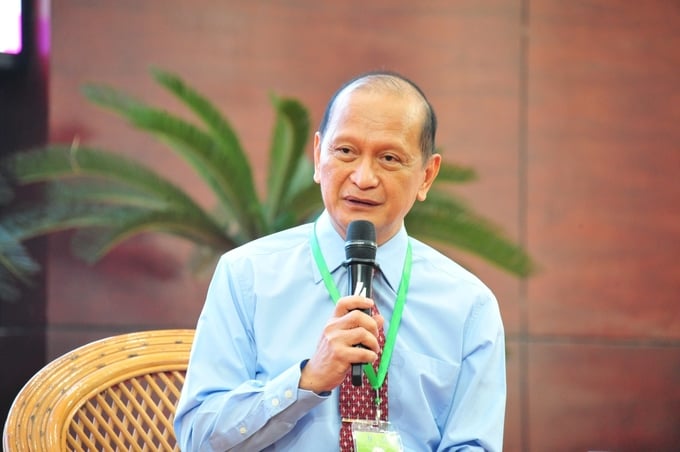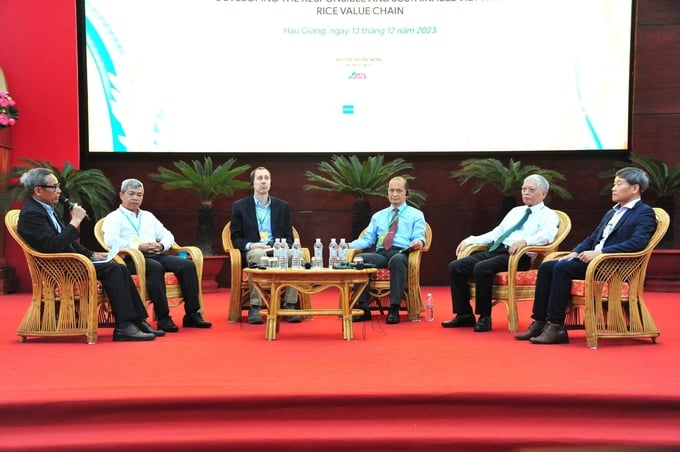May 30, 2025 | 07:44 GMT +7
May 30, 2025 | 07:44 GMT +7
Hotline: 0913.378.918
May 30, 2025 | 07:44 GMT +7
Hotline: 0913.378.918

Leocadio Sebastian - Deputy Minister of Agriculture of the Philippines
Leocadio Sebastian - Deputy Minister of Agriculture of the Philippines, who has spent a long time in Vietnam and understands Vietnamese agriculture, assessed that Vietnam has made long strides in agricultural development.
At the Conference on Vietnam Rice Value Chain Development: Responsibility and Sustainability on the morning of December 13 in Hau Giang, Mr. Sebastian expressed his joy when returning to visit Hau Giang and the Mekong Delta region. Before returning to the Philippines to accept a management position, he was the chief representative of the International Rice Research Institute (IRRI) in Vietnam, working closely with the Ministry of Agriculture and Rural Development, consulting on science, technology, and policies for the Ministry.
As a direct participant in developing the rice value chain in Vietnam, laying the foundation for developing high-quality rice, Deputy Minister Sebastian looks back on the journey of more than 6 years of cooperation with the Ministry of Agriculture and Rural Development.
One of the outstanding projects that Mr. Sebastian directly participated in in Vietnam is Smart Map, which helps predict saltwater intrusion and climate change (CS-MAP). The Mekong Delta locations use the CS-MAP map tool to direct rice production. Based on annual climate forecasts and early season forecasts, management agencies from central to provincial levels will identify areas affected by drought, floods or saltwater intrusion at various levels, thereby providing technical recommendations to help limit damage to rice productivity and output.
He said: "10 years ago, when I came to Vietnam, I talked with Former Deputy Minister Le Quoc Doanh about how to develop the rice industry and increase the competitiveness of Vietnamese rice. Up to now, you have come a very long way with many achievements. Farmers, like me, find that they are very satisfied with rice farming. Rice prices have increased, productivity and quality are good."
He said that Vietnam's promotion of rice exports will put pressure on production. Therefore, managers need to provide a clear roadmap to ensure sustainability, not harm the environment, and balance the market economy.

Speakers participated in the seminar.
International guests see the openness of Vietnam through thematic seminars within the framework of the Festival in Hau Giang. As a leading country in rice production, Vietnam is responsible for sharing expertise, knowledge, and stories about the perseverance of scientists and farmers.
The Philippines is also trying to change to develop a more suitable rice production chain. Vietnam is a rice-exporting country. The Philippines imports about 15% each year, so the two countries have many opportunities to cooperate with each other.
“I realize that many farmers will not cultivate rice more intensively but will shift production towards producing rice with high quality, high value, and sustainable production. With the achievements of developed agriculture, Vietnam has many conditions to share and help other countries.
Vietnam's sharing and helping other countries develop rice production not only helps Vietnam but also helps everyone. Currently, countries are orienting production development in a green and sustainable direction, which is a necessary and correct path. We must change production methods to suit the changes in the specific context. In addition, we need to have comprehensive connectivity in the region," the Philippine Deputy Minister emphasized.
Rice is a traditional and important production industry in Vietnam, creating livelihoods for tens of millions of farmers across the country. In recent years, Vietnam has achieved many great achievements in rice production, making an important contribution to ensuring national food security and currently maintaining its position as one of the world's leading rice exporters with constantly increasing export turnover...
Besides the achievements, Vietnam's rice industry still faces many difficulties and problems, especially in the current context with fluctuations in the world market, changes in consumer tastes, and Climate Change. New challenges require the rice industry to adapt to improve rice quality, reduce input costs, adapt to climate change, reduce greenhouse gas emissions, and ensure national food security. Join and expand consumption markets, moving towards building a sustainable rice brand in the international market.
"Currently, facing the challenges of climate change, market fluctuations, and shifting consumer trends, the rice industry value chain needs flexible adaptations to become professional and sustainable. Not only creating high-quality products but also contributing to creating a stable and peaceful ecosystem," Minister Le Minh Hoan said at the kick-off ceremony of Vietnam-Hau Giang International Rice Festival 2023 on December 12.
Translated by Tuan Huy

(VAN) Ms. Nguyen Thi Dung, Deputy Director of Ngoc Hoang Cooperative, shared about the journey of bringing dragon fruit to Europe, achieving annual revenues in the billions of VND.

(VAN) Bamboo products from Thang Tho Bamboo Cooperative have reached many countries around the world, while also creating jobs for local workers.

(VAN) The Management Board of Con Dao National Park reported that a green sea turtle, tagged in the Philippines, has traveled thousands of kilometers to lay 84 eggs on Bay Canh Islet.

(VAN) Green technology is paving a new path for sustainable aquaculture in the Mekong Delta in particular and across the country in general, helping reduce emissions and adapt to climate change.

(VAN) On May 27, La French Tech Vietnam (the French startup and innovation community in Vietnam) held the French Tech Summit Vietnam 2025.
/2025/05/27/4731-2-223159_980.jpg)
(VAN) No votive paper, no styrofoam, no plastic bags, no plastic bottles, and no single-use plastic trays are the key rules tourists should keep in mind when visiting Con Dao.

(VAN) In the fight against plastic pollution, Vietnam has been demonstrating a proactive, pioneering, and active role in addressing the greatest environmental challenge today.